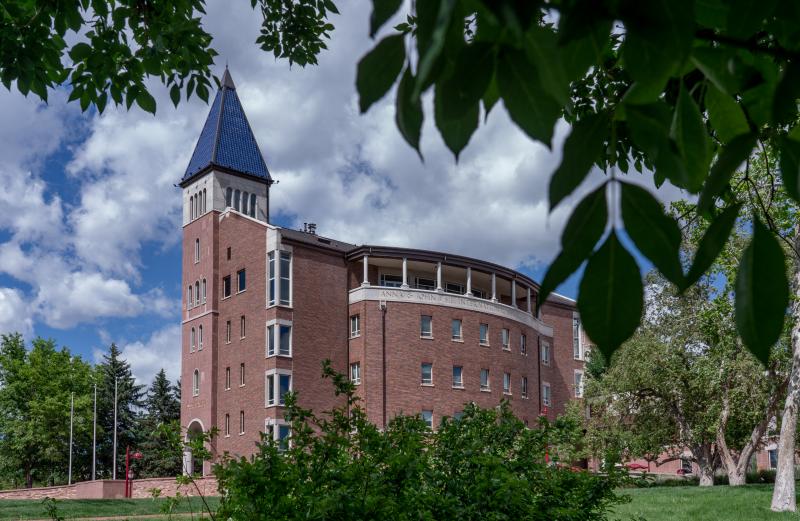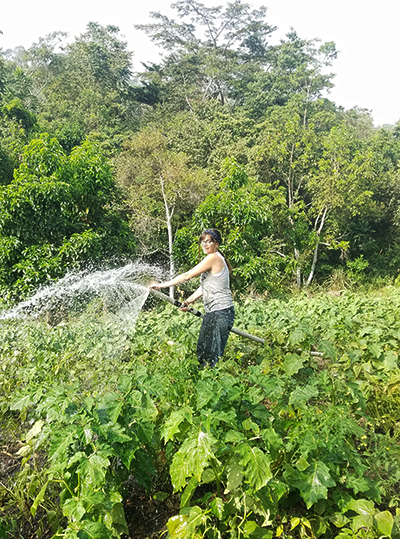More than 50 Returned/Evacuated Peace Corps Volunteers Join Korbel

For a year and a half, Jane Makepeace, a Peace Corps volunteer, called West Africa’s Togo home.
“I was in the agriculture and environmental sector, but really once you get out to your village, you kind of just take on whatever your village needs addressed. I taught at my local middle school. I taught agriculture classes, and I taught English. I worked on creating gardens with people, small-animal husbandry groups, health work at the clinic,” she says.
Though she had planned to stay in Togo for another year and a half, that plan was upended as COVID-19 began its deadly global spread. When an optional evacuation turned mandatory within the span of just a few days, Makepeace was forced to abandon her day-to-day life and plans.
“It was really weird,” she explains. “My village didn’t understand what was happening or why I had to leave because the general consensus was, we’d be safer in Africa. A lot of my projects — I don’t really know what happened to them or if they ended up being completed.”
Makepeace returned to her home state, Montana, looking to start again, but found that no one was hiring. That’s when she turned her thoughts to graduate school and learned that, through a partnership with the Peace Corps’ Coverdell Fellows program, the University of Denver was extending a helping hand to people in just her situation.
Since 2003, the University has participated in the Coverdell program, which varies from school to school and which offers scholarships to returned Peace Corps volunteers. Until this year, DU’s Josef Korbel School of International Studies’ Coverdell Fellowship operated on a competitive basis. But, witnessing increased need, the Korbel School decided to make some changes. According to Daniel Doerr, Korbel’s director of graduate enrollment and Coverdell Fellowship coordinator, the University boosted its award for Coverdell Fellows significantly and removed the competitive aspect of the application process. This allowed the school to extend the fellowship to all admitted returned and evacuated Peace Corps volunteers.
“From Colombia and Ukraine to Cambodia and Rwanda, they have served in countries around the globe, and they have worked on everything from business, health and environmental issues to education and English-language instruction,” Doerr says. “Because of their service and the roles they have had overseas, they are perfect fits for the programs at Korbel, and that’s one of the reasons we tried to do what we could for these folks this year.”
For Makepeace, this additional financial aid made graduate school possible — a step she believes will significantly impact her pursuit of a career in international development.
And she’s not alone. This year’s incoming graduate student cohort includes more than 50 returned/evacuated Peace Corps volunteers, who served in 29 different countries. These students represent nearly a quarter of the incoming Korbel class and signify a re-energizing of the relationship between DU and the Peace Corps, Doerr says.
“It’s really about facilitating this intercultural awareness and understanding,” he explains. “These two institutions prepare leaders to take on the most pressing global issues of the generation.”
Korbel Dean Fritz Mayer says the University values what these students bring to the classroom.
“These are people who have already voted with their feet to show that they care about international relations, and they have had real-world experience around the world,” Mayer says. “When you’re learning about political economy or international relations, it can be very abstract. To have people in the classroom who can draw on their personal experiences and say, ‘When I was in Ghana this is what I saw,’ and to share those very concrete examples, it brings this material to life.”
Debbie Gaylinn, director of graduate student affairs, agrees: “They bring a level of experience that is really just going to add to the dialogue and the conversation in every class they are in. Their experiences are going to permeate the whole program.”
For her part, Makepeace, who plans to study international development, is excited to begin her DU journey alongside so many fellow Peace Corps volunteers. Although she regrets that she can’t be back in Togo, she’s ready to put all of her work and knowledge to use in the classroom.
“[We] understand what it’s like to be on the ground with the people we are trying to help, what their day-to-day lives actually look like and what the best approaches are to reach people,” Makepeace says. “I think this will provide a lot of different perspectives from people who have seen directly the benefits and what is and isn’t working in development right now.”



